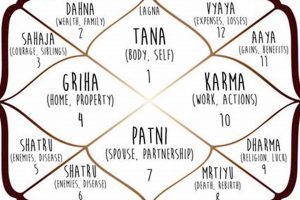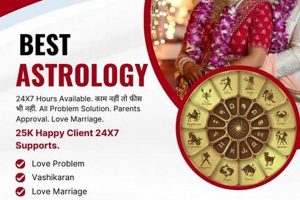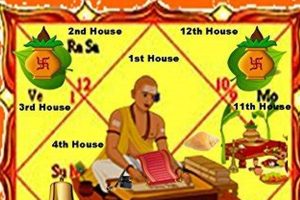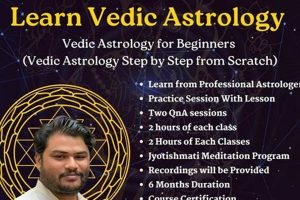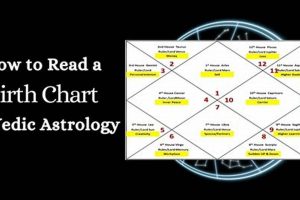Study in this field typically involves exploring the ancient Indian system of astrology, including planetary positions, constellations (nakshatras), and their influence on human lives. Students might learn to create and interpret birth charts, predict future trends, and offer remedies based on Vedic principles. A program of instruction might cover topics like the fundamentals of Vedic philosophy, predictive techniques, gemstone recommendations, and the intricacies of divisional charts.
Understanding the celestial influences outlined in this tradition can provide individuals with self-awareness, enabling them to navigate life’s challenges and capitalize on opportunities more effectively. Rooted in ancient scriptures and astronomical observations, this knowledge offers a unique perspective on human destiny and free will. Developing proficiency in this area can be a valuable tool for personal growth and for offering guidance to others.
This exploration delves further into specific aspects of the subject, providing a detailed examination of its core components and practical applications. The following sections will address the curriculum, historical development, and relevance of this ancient practice in the modern world.
Tips for Studying Vedic Astrology
Engaging with the intricate subject of Vedic astrology requires dedication and a systematic approach. These tips offer guidance for effective learning and practice.
Tip 1: Establish a Strong Foundation. Begin with foundational texts and resources that explain core concepts like the zodiac signs, planets, houses, and nakshatras. A solid understanding of these fundamentals is crucial for further exploration.
Tip 2: Find a Qualified Mentor. Guidance from an experienced practitioner can significantly accelerate the learning process. A mentor can offer personalized insights, answer specific questions, and provide practical advice.
Tip 3: Practice Chart Interpretation Regularly. Analyzing birth charts is essential for developing proficiency. Start with your own chart and gradually progress to interpreting charts of family and friends.
Tip 4: Explore Different Branches. Vedic astrology encompasses various branches, including predictive astrology, remedial astrology, and electional astrology. Exploring different areas can broaden understanding and expertise.
Tip 5: Develop Critical Thinking Skills. Avoid blindly accepting interpretations. Cultivate critical thinking and question assumptions to form your own understanding of the subject.
Tip 6: Embrace Lifelong Learning. Vedic astrology is a vast and complex subject. Continuously seek new knowledge and refine understanding through ongoing study and practice.
Tip 7: Integrate Ethical Considerations. Use astrological knowledge responsibly and ethically. Focus on providing guidance and empowering individuals rather than making fatalistic predictions.
By following these tips, one can navigate the complexities of Vedic astrology and develop a deeper appreciation for its insights. Consistent study and practice will enhance proficiency and enable a more meaningful engagement with this ancient system.
The insights gained through studying Vedic astrology can empower individuals to make informed decisions and navigate life’s journey with greater awareness. The concluding section will summarize the key benefits and highlight the transformative potential of this ancient practice.
1. Curriculum Depth
A comprehensive curriculum is paramount for a Vedic astrology course. Depth of coverage ensures students develop a nuanced understanding, moving beyond superficial interpretations to grasp the subject’s intricacies. This section explores key facets contributing to a robust curriculum.
- Foundational Principles
A solid foundation encompasses the core elements of Vedic astrology, including the zodiac, planets, houses (bhavas), and nakshatras. Understanding their individual characteristics and interrelationships is crucial for accurate chart interpretation. This foundational knowledge forms the basis for more advanced studies.
- Predictive Techniques
The curriculum should delve into various predictive techniques, such as planetary transits (gochara), planetary periods (dashas), and annual charts (varshphal). These tools enable students to forecast potential life events and trends. Practical examples and case studies can illustrate their application and enhance comprehension.
- Remedial Measures
Vedic astrology offers remedies (upaya) to mitigate negative planetary influences. A comprehensive curriculum explores gemstone recommendations, mantra chanting, and other remedial measures. Ethical considerations surrounding the application of these remedies should also be addressed.
- Divisional Charts
Divisional charts (varga charts) provide specialized insights into specific areas of life, such as career, relationships, and health. A thorough curriculum explores these charts, empowering students to offer more targeted guidance. Understanding the strengths and limitations of each divisional chart is essential.
These interconnected facets contribute to a deep and meaningful understanding of Vedic astrology. A curriculum encompassing these elements prepares students for practical application and further exploration of this complex subject. Ultimately, curriculum depth empowers individuals to utilize Vedic astrology as a tool for self-discovery and informed decision-making.
2. Instructor Expertise
Instructor expertise plays a pivotal role in the efficacy of a Vedic astrology course. A qualified instructor bridges the gap between complex theoretical concepts and practical application, guiding students through the intricacies of this ancient system. Deep knowledge of astrological principles, combined with practical experience, allows instructors to provide nuanced insights and address student queries effectively. For instance, an instructor with a strong understanding of divisional charts can elucidate their subtle interpretations, enabling students to analyze birth charts with greater precision. Similarly, experienced instructors can offer valuable perspectives on the ethical considerations surrounding astrological consultations, fostering responsible practice among students. The lineage of an instructor, often tracing back to established schools of Vedic thought, can further enhance the learning experience, providing students with a connection to a rich tradition of astrological knowledge.
The impact of instructor expertise extends beyond the classroom. Students benefit from mentorship and guidance as they embark on their astrological journey. An experienced instructor can provide personalized feedback on chart interpretations, helping students refine their skills and develop confidence. Moreover, access to an instructor’s network of fellow practitioners and resources can open doors to further learning opportunities. The ability to connect with a knowledgeable mentor can be instrumental in navigating the challenges and complexities of astrological practice. Real-world examples of successful astrologers often highlight the influence of a skilled mentor in shaping their careers. This emphasizes the importance of seeking guidance from established practitioners when pursuing a Vedic astrology course.
In essence, instructor expertise forms a cornerstone of a successful learning experience in Vedic astrology. It equips students with not only theoretical knowledge but also the practical skills and ethical grounding necessary for responsible practice. The guidance of an experienced instructor can significantly enhance the depth of understanding and pave the way for continued growth in this complex and multifaceted field. Choosing a course with a qualified instructor is therefore an investment in one’s astrological journey, ensuring a solid foundation and maximizing the potential for meaningful insights.
3. Practical Application
Practical application forms the cornerstone of a successful Vedic astrology course, bridging theoretical knowledge and real-world interpretation. The ability to analyze birth charts, predict potential life events, and offer personalized guidance requires hands-on experience. A course emphasizing practical application equips students with the skills necessary to navigate the complexities of astrological interpretation. For example, students might analyze case studies of individuals facing career dilemmas, relationship challenges, or health concerns, learning how to apply astrological principles to offer tailored solutions. This practical approach fosters critical thinking and problem-solving abilities, enabling students to move beyond rote memorization and develop a nuanced understanding of Vedic astrology.
The benefits of practical application extend beyond the classroom. Hands-on experience builds confidence and competence, allowing students to transition smoothly into professional practice or personal exploration. Regularly interpreting birth charts hones analytical skills and deepens understanding of astrological principles. Engaging with real-life scenarios provides invaluable insights into the intricacies of human experience, fostering empathy and compassion. Furthermore, practical application encourages continuous learning. Each chart analysis presents unique challenges and opportunities for growth, prompting students to refine their interpretive skills and deepen their knowledge of Vedic astrology.
In summary, practical application is not merely a component of a Vedic astrology course; it is the essence of its transformative potential. It empowers students to apply ancient wisdom to contemporary challenges, fostering self-awareness, informed decision-making, and a deeper understanding of the human condition. The integration of practical exercises, case studies, and real-world examples ensures that students not only grasp theoretical concepts but also develop the skills and confidence necessary to navigate the complexities of astrological practice, fostering both personal growth and the ability to offer meaningful guidance to others. The ultimate measure of a Vedic astrology course lies in its ability to equip students with the practical skills to unlock the wisdom embedded within the celestial tapestry.
4. Historical Context
Understanding the historical context is crucial for students of Vedic astrology. This ancient system, rooted in the Vedas and other sacred texts of India, carries a rich tradition spanning millennia. Exploring its historical evolution provides valuable insights into its core principles and practices. The development of Vedic astrology is intertwined with the broader intellectual and spiritual history of India. Tracing its origins back to the Vedic period illuminates the philosophical underpinnings that shape its interpretations. Examining how astronomical observations and mathematical calculations were integrated into astrological frameworks provides a deeper appreciation for the system’s complexity and sophistication. For example, understanding the historical development of the nakshatra system, based on lunar mansions, reveals its connection to ancient astronomical practices. Similarly, exploring the evolution of predictive techniques like planetary periods (dashas) sheds light on how astrologers refined their methods over time. This historical perspective enhances the study of a Vedic astrology course, providing a richer understanding of the subject’s nuances.
The historical context also illuminates the cultural and social influences that shaped Vedic astrology. Exploring its role in ancient Indian society, from royal courts to everyday life, reveals its enduring relevance. Understanding how astrological consultations were integrated into various aspects of life, such as marriage, career choices, and health decisions, provides a nuanced perspective on its practical applications. Furthermore, examining the historical interactions between Vedic astrology and other systems of knowledge, such as Ayurveda and Yoga, reveals interconnectedness within traditional Indian thought. For instance, exploring the shared principles between Vedic astrology and Ayurveda highlights the holistic approach to well-being that characterized these disciplines. This understanding of historical interconnectedness enhances the study of Vedic astrology, allowing students to appreciate its broader significance within a cultural and intellectual framework. The transmission of astrological knowledge across generations, often within families or lineages of scholars, also shaped its development. Recognizing these historical lineages provides a deeper appreciation for the continuity of tradition within Vedic astrology.
In summary, integrating historical context into a Vedic astrology course enriches the learning experience. It provides a deeper understanding of the system’s origins, evolution, and cultural significance. This historical perspective empowers students to approach Vedic astrology with greater nuance and appreciation, recognizing its profound connection to a rich intellectual and spiritual heritage. Moreover, understanding the historical context allows students to situate contemporary practices within a broader tradition, fostering a more informed and meaningful engagement with this ancient system of knowledge. This historical grounding provides a solid foundation for exploring the practical applications of Vedic astrology in the modern world, bridging the gap between ancient wisdom and contemporary challenges. The study of historical context is therefore essential for a comprehensive understanding and appreciation of Vedic astrology.
5. Ethical Considerations
Ethical considerations form an integral part of any reputable Vedic astrology course. Responsible practice requires sensitivity, integrity, and a commitment to client well-being. This involves recognizing the potential impact of astrological pronouncements and exercising caution against making fatalistic predictions. For instance, suggesting a specific career path based solely on a birth chart without considering individual aptitudes and aspirations can be ethically problematic. Similarly, predicting negative life events without offering constructive solutions can create undue anxiety and disempowerment. Ethical practitioners prioritize empowering clients to make informed decisions, fostering self-awareness rather than dependence. This entails providing balanced interpretations, acknowledging the limitations of astrological predictions, and respecting client autonomy. A Vedic astrology course should emphasize these ethical considerations, ensuring students develop a strong moral compass alongside their technical skills. Real-life examples of ethical dilemmas, such as navigating client confidentiality or dealing with conflicting interpretations, can provide valuable learning opportunities.
Furthermore, ethical considerations extend to the broader application of Vedic astrology. Respect for cultural sensitivity is paramount, particularly when interpreting charts for individuals from diverse backgrounds. Avoiding generalizations and stereotypes is crucial. For example, assuming specific personality traits based solely on an individual’s zodiac sign without considering cultural nuances can lead to misinterpretations. Ethical practitioners strive for inclusivity and recognize the complexities of individual experiences. Moreover, ethical considerations encompass the marketing and promotion of astrological services. Avoiding exaggerated claims or promises of guaranteed outcomes is essential for maintaining credibility and trust. Transparency and honesty in client interactions are fundamental principles of ethical practice. A Vedic astrology course should equip students with the critical thinking skills necessary to navigate these ethical complexities. Case studies and discussions can facilitate deeper engagement with these issues, fostering a culture of responsible practice within the field.
In conclusion, ethical considerations are not merely an addendum to a Vedic astrology course; they are fundamental to its integrity. Responsible practice requires a commitment to client well-being, cultural sensitivity, and transparency. Integrating ethical discussions and practical examples throughout the curriculum empowers students to navigate the complexities of astrological consultations with integrity and compassion. This emphasis on ethical practice ensures that Vedic astrology remains a tool for self-discovery and empowerment, fostering positive transformation and avoiding the pitfalls of fatalism and exploitation. The ethical practitioner understands that Vedic astrology offers insights, not dictates, and empowers individuals to navigate their life journeys with greater awareness and responsibility. This ethical grounding is essential for maintaining the integrity of Vedic astrology and ensuring its continued relevance in a complex and ever-evolving world.
Frequently Asked Questions about Vedic Astrology Courses
This section addresses common inquiries regarding Vedic astrology courses, providing clarity for prospective students.
Question 1: What is the typical duration of a Vedic astrology course?
Course duration varies depending on the depth and breadth of the curriculum. Foundational courses may span several months, while advanced programs can extend over several years. Some programs offer flexible pacing, allowing students to progress at their own speed.
Question 2: What are the prerequisites for enrolling in a Vedic astrology course?
Most introductory courses require no prior knowledge of astrology. However, a basic understanding of mathematics and astronomy can be beneficial. Advanced programs may have prerequisites, such as completion of foundational courses.
Question 3: How are Vedic astrology courses typically structured?
Course structures vary, encompassing online instruction, in-person classes, or a blended format. Some programs offer live interactive sessions, while others provide pre-recorded lectures and study materials. Practical exercises, chart analysis, and case studies are often integral components.
Question 4: What career opportunities are available after completing a Vedic astrology course?
Graduates may pursue careers as professional astrologers, offering consultations to clients. Others integrate astrological knowledge into related fields, such as counseling, coaching, or alternative healing. Some individuals utilize their understanding for personal growth and self-discovery.
Question 5: How does one discern the credibility of a Vedic astrology course?
Evaluating instructor expertise, curriculum depth, and institutional reputation is crucial. Seeking recommendations from established practitioners and researching the lineage and credentials of instructors can inform decision-making.
Question 6: What is the difference between Vedic astrology and Western astrology?
Vedic astrology, rooted in ancient Indian scriptures, utilizes a sidereal zodiac based on the fixed constellations. Western astrology employs a tropical zodiac based on the equinoxes. This fundamental difference leads to variations in planetary placements and interpretations.
Understanding these key aspects can assist prospective students in making informed decisions about pursuing a Vedic astrology course. Thorough research and careful consideration of individual learning styles and goals are essential for a fulfilling educational experience.
The subsequent section delves into student testimonials and success stories, offering real-world perspectives on the transformative potential of Vedic astrology courses.
Conclusion
Exploration of Vedic astrology courses reveals a path to understanding celestial influences on human lives. Key aspects include curriculum depth, encompassing foundational principles, predictive techniques, remedial measures, and divisional charts. Instructor expertise provides essential guidance, bridging theory and practice. Practical application, through chart analysis and case studies, hones interpretive skills. Historical context illuminates the system’s origins and evolution, while ethical considerations ensure responsible practice. Addressing frequently asked questions clarifies course duration, prerequisites, structure, career opportunities, and credibility assessment. Distinguishing Vedic astrology from Western astrology underscores its unique perspective.
The pursuit of knowledge in this ancient system offers a journey of self-discovery and the potential for empowering individuals to navigate life’s complexities with greater awareness. The insights gained through Vedic astrology courses can foster a deeper understanding of the human condition and the interconnectedness of all beings. This exploration encourages further investigation and contemplation of the profound wisdom embedded within this ancient tradition.


